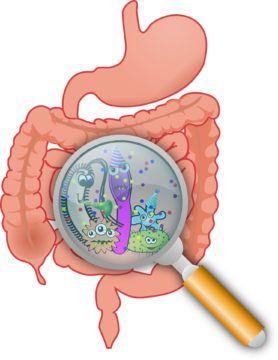From Phys.Org:
 A University of Alberta-led research study followed more than 400 infants from the CHILD Cohort Study (CHILD) at its Edmonton site. Boys at one year of age with a gut bacterial composition that was high in the bacteria Bacteroidetes were found to have more advanced cognition and language skills one year later. The finding was specific to male children. “It’s well known that female children score higher (at early ages), especially in cognition and language,” said Anita Kozyrskyj, a professor of pediatrics at the U of A and principal investigator of the SyMBIOTA (Synergy in Microbiota) laboratory. “But when it comes to gut microbial composition, it was the male infants where we saw this obvious connection between the Bacteroidetes and the improved scores.”
A University of Alberta-led research study followed more than 400 infants from the CHILD Cohort Study (CHILD) at its Edmonton site. Boys at one year of age with a gut bacterial composition that was high in the bacteria Bacteroidetes were found to have more advanced cognition and language skills one year later. The finding was specific to male children. “It’s well known that female children score higher (at early ages), especially in cognition and language,” said Anita Kozyrskyj, a professor of pediatrics at the U of A and principal investigator of the SyMBIOTA (Synergy in Microbiota) laboratory. “But when it comes to gut microbial composition, it was the male infants where we saw this obvious connection between the Bacteroidetes and the improved scores.”
“The differences between male and female gut microbiota are very subtle, but we do know from CHILD Cohort Study data that girls at early ages are more likely to have more of these Bacteroidetes. So perhaps most girls have a sufficient number of Bacteroidetes and that’s why they have improved scores over boys,” added Kozyrskyj. The researchers, led by Kozyrskyj and associate professor of pediatrics Piush Mandhane, studied bacteria found in fecal samples from the infants and identified three different groups exhibiting similar dominant clusters of bacteria. They then evaluated the infants on a variety of neural developmental scales. Of those groups, only the male infants with Bacteroidetes-dominant bacteria showed signs of enhanced neurodevelopment.
More here.
